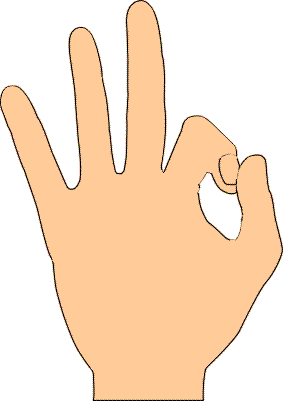|
ESL Forum:
Techniques and methods
in Language Teaching
Games, activities
and teaching ideas
Grammar and
Linguistics
Teaching material
Concerning
worksheets
Concerning
powerpoints
Concerning online
exercises
Make suggestions,
report errors
Ask for help
Message board
|
ESL forum >
Games, activities and teaching ideas > Semi Debate Topic! Things Not to Do Abroad
Semi Debate Topic! Things Not to Do Abroad
|

Zora

|
Semi Debate Topic! Things Not to Do Abroad
|
As I was having a tea and a biscuit, I came across this article and began wondering just how much of it was true and then if anybody has been in any of these situations or knows of more "innocent" gestures that could offend someone in other countries???
http://uk.travel.yahoo.com/p-promo-3361594

|
15 Sep 2011
|
|
|
|

Anna P

|
Don �t ever use this gesture to mean OK in Brazil, OK?
 Here it is REALLY bad! |
15 Sep 2011
|
|
|

douglas

|
|
The gesture in Greek is correct, but when I lived in Athens it was explained to me that it meant a curse on many generations of your family (NOT rubbing excrement in your face).
The thumb between two fingers also has vulgar connotations in Germany.
Another interesting one in Germany is holding one hand loosely closed (as if you were holding an invisible broom stick) and then slapping the small opening at the thumb and forefinger with the palm of the other hand--it is quite vulgar and should not be done in public where women are present (it is understood to be directed and a woman in the area). I for most of my life I have slap my hands similarly out of boredom, I did it once while training some German soldiers (male and female) on the obstacle course--luckily one of soldiers calle dme aside and told me what it meant and I have since learned not to do as a nervous habit.
Douglas |
15 Sep 2011
|
|
|

maryse pey�

|
|
indeed some usual and inoffensive gestures in our own country may be an insult or something very rude in others. As for some special words.
for example never say �tchin tchin � in Japan when you are making a toast. Say �Kampa� �. Our French �tchin tchin � to say �I �m glad to drink and be with you � means... the most male sex...
As I said once : �when in Rome do as the Romans do �. I knew a Japanese man who only bowed to say �hello � when he saw his father after 7 years...
So I think it is wise to read about foreign habits before going abroad. |
15 Sep 2011
|
|
|

valentinaper

|
 While an open palm may show the number five in other countries, when you count in Greece, face the palm to yourself, because this gesture is very rude. When I tried to find out more about it, I was told it is a curse, probably meaning "May your head, both arms and legs be cut from your body". These are five body parts, which could explain the five fingers, but I �m not sure. While an open palm may show the number five in other countries, when you count in Greece, face the palm to yourself, because this gesture is very rude. When I tried to find out more about it, I was told it is a curse, probably meaning "May your head, both arms and legs be cut from your body". These are five body parts, which could explain the five fingers, but I �m not sure. Another one I only recently found out about, is that when you want to show "two" in the UK, the back of your palm should never face yourself, because this is insulting. Is that true? |
15 Sep 2011
|
|
|

GIOVANNI

|
|
Several years ago when we were in Bulgaria we almost got on the wrong train because during our first visit to Bulgaria, we were unaware that shaking your head left-to-right means �yes,� while nodding your head up-and-down means �no.� It can be very confusing when asking for directions. I �m sure in most places it is understood which way to shake with foreigners, but in small towns it was another story at that time. |
15 Sep 2011
|
|
|

edrodmedina

|
|
When I was younger there was this broad that...oh sorry what not to do abroad!!!! I get it. |
16 Sep 2011
|
|
|

Sainte-Marie

|
|
I think also patting on the head is not good in any country. Imagine someone would pat you on the head as though you �re a pet. I remember in Russia, in a subway train, one panhandler, disguised as a priest, was begging for money. I gave him some, and he saying �thank you � patted me on the head. I didn �t like it. :)
Interesting about a Chinese culture -- leaving a plate full. I didn �t know about it, that �s why they kept on serving and serving. |
16 Sep 2011
|
|
|

Jayho

|
Ed - I love your reading you witty comments - they put a smile on my face  |
16 Sep 2011
|
|
|

juliag

|
I think giving things with 2 hands is certainly seen as more respectful here and business cards, things associated with the tea ceremony or other traditional arts etc. should always be passed that way, and in other formal situations it is good to do that, too.
But I would say in informal situations it �s fine to pass things with one hand, most of my Japanese friends don �t do that.
What should be avoided is a thumbs down for no as it means death here, though if you meet any of my students you �ll be alright as I �ve told them it just means a simple no or no good in English-speaking countries.
|
16 Sep 2011
|
|
|






 Here it is REALLY bad!
Here it is REALLY bad!












